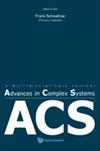耗散算术
IF 1
4区 数学
Q4 MATHEMATICS, INTERDISCIPLINARY APPLICATIONS
引用次数: 0
摘要
大的算术表达式是耗散的:它们丢失信息并且对扰动具有鲁棒性。缺乏守恒使波动具有弹性。浮点的有限精度以及线性和非线性运算的混合使得这些函数具有抗脆弱性,并赋予了一个基本稳定的局部平坦平台丰富的适应度景观。这减缓了复杂程序的长期进化,表明在基于树的遗传规划中需要深度感知的交叉和突变算子。它还表明,深度嵌套的计算机程序源代码是容错性的,因为中断往往无法传播,因此测试预言机的最佳位置尽可能接近实际的软件缺陷。本文章由计算机程序翻译,如有差异,请以英文原文为准。
Dissipative Arithmetic
Large arithmetic expressions are dissipative: they lose information and are robust to perturbations. Lack of conservation gives resilience to fluctuations. The limited precision of floating point and the mixture of linear and nonlinear operations make such functions anti-fragile and give a largely stable locally flat plateau a rich fitness landscape. This slows long-term evolution of complex programs, suggesting a need for depth-aware crossover and mutation operators in tree-based genetic programming. It also suggests that deeply nested computer program source code is error tolerant because disruptions tend to fail to propagate, and therefore the optimal placement of test oracles is as close to software defects as practical.
求助全文
通过发布文献求助,成功后即可免费获取论文全文。
去求助
来源期刊

Advances in Complex Systems
综合性期刊-数学跨学科应用
CiteScore
1.40
自引率
0.00%
发文量
121
审稿时长
6-12 weeks
期刊介绍:
Advances in Complex Systems aims to provide a unique medium of communication for multidisciplinary approaches, either empirical or theoretical, to the study of complex systems. The latter are seen as systems comprised of multiple interacting components, or agents. Nonlinear feedback processes, stochastic influences, specific conditions for the supply of energy, matter, or information may lead to the emergence of new system qualities on the macroscopic scale that cannot be reduced to the dynamics of the agents. Quantitative approaches to the dynamics of complex systems have to consider a broad range of concepts, from analytical tools, statistical methods and computer simulations to distributed problem solving, learning and adaptation. This is an interdisciplinary enterprise.
 求助内容:
求助内容: 应助结果提醒方式:
应助结果提醒方式:


